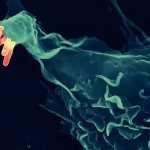Lien vers Pubmed [PMID] – 30953426
Microbiol Spectr 2019 03;7(2)
The spatial dimensions of host cells and bacterial microbes are perfectly suited to being studied by microscopy techniques. Therefore, cellular imaging has been instrumental in uncovering many paradigms of the intracellular lifestyle of microbes. Initially, microscopy was used as a qualitative, descriptive tool. However, with the onset of specific markers and the power of computer-assisted image analysis, imaging can now be used to gather quantitative data on biological processes. This makes imaging a driving force for the study of cellular phenomena. One particular imaging modality stands out, which is based on the physical principles of fluorescence. Fluorescence is highly specific and therefore can be exploited to label biomolecules of choice. It is also very sensitive, making it possible to follow individual molecules with this approach. Also, microscopy hardware has played an important role in putting microscopy in the spotlight for host-pathogen investigations. For example, microscopes have been automated for microscopy-based screenings. A new generation of microscopes and molecular probes are being used to image events below the resolution limit of light. Finally, workflows are being developed to link light microscopy with electron microscopy methods via correlative light electron microscopy. We are witnessing a golden age of cellular imaging in cellular microbiology.

